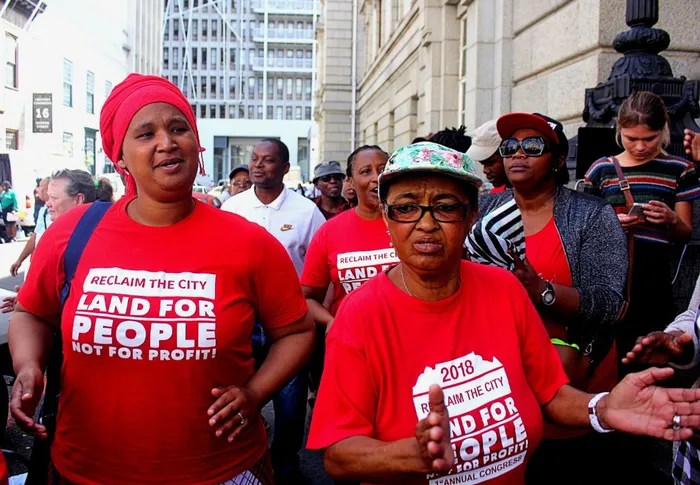High Court dismisses the province’s leave to appeal Tafelberg sale

Ndifuna Ukwazi and Reclaim the City members outside the High Court in August last year.
Housing rights activist groups have claimed victory after the Western Cape High Court dismissed the Western Cape Provincial Government and the City of Cape Town’s application for leave to appeal its decision to set aside the sale of the Tafelberg property in Sea Point.
The decision in this ongoing battle between Ndifuna Ukwazi and Reclaim the City taking on the Province and City was heard at the High Court on Friday, April 23
The court has, however, granted both the province and the City a leave to appeal certain aspects of its judgment it made in August last year, when the High Court set aside the province’s sale of the former Tafelberg School in Sea Point to the Phyllis Jowell Jewish Day School in November 2015 for R135 million.
The housing activists group stated that the confirmation that the sale will not go ahead is a significant victory for Reclaim the City (RTC) and Ndifuna Ukwazi who have advocated for years for the sale to be set aside and for the site to be used for the development of social housing.
“The decision means that the sale of the Tafelberg site will not go through and that the site will revert back to the Province, where, we hope, this public land will finally be used for the public good,” they said.
The Western Cape government applied for leave to appeal the court ruling due to the “extensive nature of the finding” and its potential implications.
They said the findings of the court could impact on the Western Cape Government’s core functions going forward, including the right of the executive to determine how and where their budget is allocated province-wide; the right to determine how to dispose of assets, in a transparent manner in order to raise funds for constrained service-delivery objectives; and their right to operate within a participative democracy that is sufficiently flexible to enable them to do the job they have been mandated to do.
The High Court dismissed the Province’s application for leave to appeal its orders, setting aside the sale and declaring that Sea Point falls within a restructuring zone in terms of the Social Housing Act - these are well-located areas within which the development of social housing is prioritised in order to advance spatial, economic and social restructuring.
“The court’s affirmation that Sea Point falls into a restructuring zone means that the Province and City can access funding for the development of social housing in Sea Point, meaning that this cannot be used as an excuse not to prioritise social housing in the area,”said head of research and advocacy for Ndifuna Ukwazi, Michael Clark.
Sharing these sentiments, director at Ndifuna Ukwazi, Mandisa Shandu said as the country pauses to reflect on Freedom Day, they recognise that the need to urgently unlock land for the development of affordable housing is fundamental to achieving the vision of a more just, more equal society in which all residents can claim a sense of belonging, and freedom.
“The High Court’s judgment constitutes a radical break with the past and is an important step towards dismantling the systems of power that hold structural equality in place. The struggle for Tafelberg represents an achievement for land and housing activists across the country- it demonstrates that a business-as-usual approach to accessing land which favours private property power, can and must be interrupted. It confirms that accessing strategically located public land - starting with the Tafelberg property - to redress spatial apartheid is possible,” she said.
Responding to the judgement, Western Cape Premier, Alan Winde, said the Western Cape Government notes the judgment by the Western Cape High Court, granting leave to appeal against the majority of the orders that were made by the Court on August 31, 2020. He said they will consider with their legal team the remaining orders (against which leave to appeal has not been granted) before deciding on the way forward.
He said the property’s return to their portfolio gives them the opportunity to re-consider its future use in light of the priorities of this new administration.
“The Western Cape Government is absolutely committed to achieving spatial redress. All levels of government across South Africa can and must do more in this regard, and we acknowledge this. Redressing the wrongs of our painful past is a priority of our administration. We swore an oath to the Constitution of the Republic of South Africa, and we intend do all we can to make sure our province becomes inclusive, knowing that there are no quick fixes, and that this is a road we must walk together,” he said.
“We hope others will cease playing politics or engaging in the incitement of further illegal acts around the important matter of spatial redress,” he said.